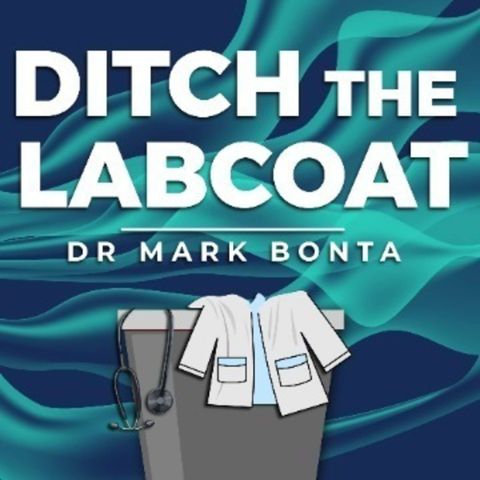De-clotting with Dr. Eric Kaplovitch

Download and listen anywhere
Download your favorite episodes and enjoy them, wherever you are! Sign up or log in now to access offline listening.
Description
DISCLAMER >>>>>> The Ditch Lab Coat podcast serves solely for general informational purposes and does not serve as a substitute for professional medical services such as medicine or nursing. It...
show more>>>>>> The expressed opinions belong solely to the hosts and guests, and they do not necessarily reflect the views or opinions of the Hospitals, Clinics, Universities, or any other organization associated with the host or guests.
Disclosures: Ditch The Lab Coat podcast is produced by (Podkind.co) and is independent of Dr. Bonta's teaching and research roles at McMaster University, Temerty Faculty of Medicine and Queens University.
Welcome back to "Ditch the Lab Coat," the podcast where we explore the fascinating world of health and medicine with a skeptical eye. I'm Dr. Mark Bonta and In today's episode, Dr. Kaplovitch dives deep into the different types of blood clots and the importance of personalized treatment. He explains that not all blood clots are created equal - some predominantly affect the veins, while others can travel to the lungs and become life-threatening. We discuss the various risk factors that can lead to blood clot formation, from genetic conditions to long plane rides, and Dr. Kaplovitch offers practical advice on managing this complex disorder.We also touch on the fascinating history behind some blood thinning medications, like warfarin, which was originally used as rat poison! Dr. Kaplovitch clarifies the distinctions between its toxic properties and medical use. Throughout our conversation, we emphasize the importance of transparently counseling patients about the risks and benefits of different treatments. Dr. Kaplovitch highlights the abundance of research in the field of thrombosis and how it informs the personalized approach he takes with his patients.So join us as we simplify these complex medical concepts and explore the latest advancements in blood clot prevention and treatment. As always, remember that this podcast is for informational purposes only and does not substitute for professional medical advice. Let's ditch the lab coat and dive in!
04:24 Experienced medical student impresses with professionalism.
09:02 Blood clots can travel to lungs, fatal.
12:14 Prolonged sitting at desk may increase thrombosis risk.
16:01 Minority with blood clots can improve naturally.
18:45 Clot busters have significant risk of bleeding.
20:59 Treatment options for preventing blood clot complications.
25:39 Passion for vascular medicine, citing primary literature.
29:26 Newer blood thinners may have advantages.
31:37 Warfarin inhibits clotting by blocking vitamin K.
36:09 Balancing blood thinness for health benefits is crucial.
37:22 Maintain optimal blood thinness to prevent risks.
42:22 Minor bleeding from gut might not require action.
46:27 Consistent blood thinner use is crucial.
50:05 Discussing evolving thrombosis practices, specifically genetic testing controversies.
51:24 Testing for clotting disorders requires informed discussion.
57:02 Advancements in personalized medicine revolutionize treatment.
58:45 Hip hop slang reference and deep thrombosis.
Information
Copyright 2024 - Spreaker Inc. an iHeartMedia Company

Comments